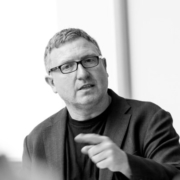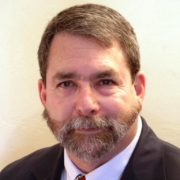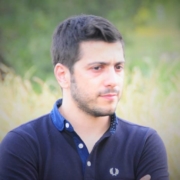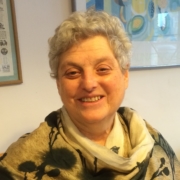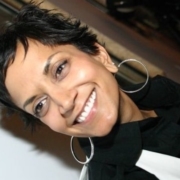Jessica Oddy
Critiquing Education in Emergencies
Today we dive into the field of education in emergencies, highlighting its entanglements with colonialism, empire, and racial capitalism. My guest is Jess Oddy.
Jess Oddy is a researcher at the university of Bristol and has worked in various capacities in the field of education in emergencies. Her new article is “Retelling education in emergencies through the black radical tradition: on racial capitalism critical race theory and fugitivity,” which was published in Globalisation, Societies and Education.
Citation: Oddy, Jess with Will Brehm, FreshEd, 344, podcast audio, March 4, 2024. https://freshedpodcast.com/oddy/
Will Brehm 0:00
Jess Oddy, welcome to FreshEd.
Jess Oddy 1:10
Thank you. Happy to be here.
Will Brehm 1:12
So, congratulations on the article. I want to just jump right into kind of a big question for listeners who might not know too much about the field of education in emergencies. How would you describe the field of education in emergencies? Like, who are the actors involved? What are the big questions that scholars are asking in this field?
Jess Oddy 1:30
Yeah, that’s a great question. So, education in emergencies, often referred to as EIE, is a field that addresses the educational needs of children, youth, adults affected by crisis, and by the term crisis, this can be applied very broadly, such as conflicts, natural disasters, pandemics, and the aim is to ensure that all individuals in such situations have access to safe, quality, and relevant education. In terms of who’s involved, we’ll see a wide range of stakeholders; governments, nongovernmental organizations, NGOs, international nongovernmental organizations, local communities, academia, children and families. And I think in terms of the scholars, people who are involved in this from an academic perspective, they’re often asking big questions related to the quality of the education interventions, the intersections of humanitarianism, aid, trade and other socio-political factors. There’s a lot of literature around the impact of crisis on education systems, the effectiveness of different interventions, the role of education in promoting peace and resilience,
Will Brehm 2:38
You can see how it’s a massive field, right? I mean, if you’re talking about natural disasters and social disasters that might arise anywhere in the world, and how education is connected to this. Yeah, it’s huge, because then you can think of things like prevention, how does the education system help prevent some of these disasters from even happening in the first place? What happens in the process of these disasters unfolding? What does education look like? How does it work? But then also sort of in the aftermath of some of these disasters and the connections to education, you can see how it really could become rather complex rather quickly. In the article, you level some critiques of the field itself of education in emergencies, and one of them is that you sort of say that there’s this entanglement between education and emergencies and colonialism. How do you see that connection?
Jess Oddy 3:27
Yes. You’re right, I do level several critiques at the field. And yeah, it’s entanglements with colonialism and how it’s connected to colonialism and histories of imperialism. I think, where to begin with that? Well, you know, as you said, the range, the diversity of emergencies that we see in the world today is ever expanding, and there is an expansion around what constitutes an emergency or humanitarian situation. For example, in the UK, we’re seeing increasingly aid budgets are being used to fund domestic programming. So, domestic programming, first policies and programs implemented by government to support or address poverty and inequality within its own borders. I think by the end of 2023, we were seeing that 5 billion pounds had been removed from the UK budget to be earmarked for domestic programming, housing refugees. And I use this term really lightly, because in the UK, many refugees and asylum seekers are placed in sites of detention. So, when I say that education in emergencies is deeply entangled and connected to colonialism, it’s really to challenge this idea that what we see and maybe the kind of narratives around aid of being inherently good. And in the paper, I talk a lot, and I refer to the work of people like Rebecca Swartz, Emily Baughan who’ve done extensive archival studies on the interconnections between humanitarianism, internationalism, and empire and the histories of the role that education itself played as a kind of tool of empire, as an arm of empire. And we see when we examine these histories that actually many of the organizations that today deliver education for emergencies programming have this history deeply embedded in the kind of colonial project. And as a field, I don’t think that’s really been addressed. And we see it continued today in the way that programs are designed, the way that the field more broadly is conceptualized, and the actors and the stakeholders who are given attention, and a lot of the narratives that come out. You can see maybe a clear continuum from histories of colonialism and empire.
Will Brehm 5:36
Could you give an example of where you see, say, the arm of empire, as you called it, where you see that reaching into the present and into some of the actual design of a program that might be considered part of education in emergencies?
Jess Oddy 5:51
Well, I would say that it is incredibly present and visible in the field to the extent that actually, I think it must have been October 2020, the Interagency Network for Education in Emergencies, so INEE, which is a renowned member network that has established itself as an authoritative body in the field of EIE over the past two decades. They issued a groundbreaking anti racism racial equity statement where they clearly highlight that and explicitly acknowledge that education in emergencies as a sector has played a role in perpetuating what they described as white supremacy culture and institutional racism through the ways that organizations have structured, through the actions. I think that revelation was very significant because there has been such limited scholarly attention to this within the field. And I say that both in academia and from my background, as a practitioner. Until 2020, the conversation around education being anything but inherently good, was never really openly explored. And that’s evident when you look online and look for advocacy, policy formulations, research, etc., program development. There’s very little around actually acknowledging these histories, and also how they resonate and still hold truth in the present.
Will Brehm 7:12
So, you’re sort of saying that this INEE statement in 2020, was a watershed moment. It sort of began to change the way or change the conversations that were happening in the field?
Jess Oddy 7:23
I wouldn’t say it was -I mean, I think it was a watershed moment for the organization. It maybe created a more visible conversation that maybe many practitioners had been putting forward and pushing behind the scenes for many, many years. I think it’s really telling that a sector that’s kind of primary goal is to support people who’ve been most impacted by structural dispossession, for example, had never really grappled with education inequalities studies, or the fields that looked at kind of racial inequity that looked at other forms of marginalization like that. I would say that’s still not really prevalent in the field, although, of course, we’re seeing many more people coming through and sharing kind of critique. So, I think, yeah, definitely since 2020, there are more people coming forward and talking and bringing really interesting perspectives to the work, whether that connection is making the leap into the actual day to day operations outside of academia, I’m not so sure.
Will Brehm 7:23
I’d love to learn more about that because from my perspective, from someone who reads a lot of journal articles and books in the field of education, I’ve definitely seen more and more articles sort of in this light. And I never actually put the INEE statement as sort of the turning point but maybe it was part of this turning point where we’re seeing new conversations happening in the field that are very welcomed, in my opinion. For someone like yourself, who has worked in the field, and maybe still has a foot in the practical space, is it translating? Is that sort of conversation that’s happening, let’s say on paper actually having an impact on the ground, so to speak to us that sort of silly dichotomy.
Jess Oddy 9:04
The pessimist in me would say, No. I think we’ve got to also think about the context in which that statement was made by INEE. And that was in 2020, this was after the murder of George Floyd, this was when there was a wave of discourse around racial inequity in particular, and that impacted every single sector, and it impacted the humanitarian aid sector of which education emergencies is a subset. And for years and years and years, you know, Kwame Nkrumah talks about in 1965, how aid as a colonial project. People have been having these conversations for decades. In 2020 there was an opening, or a reassertion and attention given to this. We saw it in the field multiple organizations like INEE come out with their own statements. We saw organizations like Save the Children which has a huge education in emergency mandate come out and declare some recognition that it had been operating in a white supremacy way or the recognition of huge inequities in the way that aid was delivered. But when we look now, in 2024, I don’t think there has been a significant shift in the way that educational aid is delivered and the conversations around it. There’s a lot of talk within the humanitarian field around localization, and this idea that local partners, local organizations should have a much more prominent role in decision making, how money should be spent, etc. Whether that has translated into the field of EIE, I don’t think so. And I think also the consistent narrative around donor funding, and this reliance on a structure that doesn’t really challenge the wider structures that result in people being forcibly displaced, living in camps, and being dependent on aid. And we see this playing out in real time right now. In the last couple of months funding has been withdrawn from UNRWA, which is the biggest provider of formal education in the Gaza Strip. And we see donors retracting from funding. That to me highlights how the system is deeply political, and that, in fact, if we want to talk about EIE in colonialism, this is for me just another example of showing that when governments give aid, it’s not necessarily from a place of benevolence. There is always a geopolitical interest there. And just as quickly as it can be given, it can be retracted. And I think many people who’ve worked as practitioners in the field will tell you time and time again, that funding has been cut without any conversation with your organization, with the people who the funding was supposed to serve. We’re used to that in the kind of practitioner world. And it’s something that’s happened quite recently, and actually in 2023, specifically with education in emergencies funding for research. And a couple of my colleagues wrote about this issue. So, yes, just to say we’re witnessing the connections and the entanglements.
Will Brehm 12:07
Yeah, I mean, I think it just shows the geopolitical nature of aid itself, and how it can’t be benevolent, necessarily, or only. And that the changing whims of geopolitics because of new leaders, because of new wars, because of new conflicts -whatever it is, it’s way beyond any individual program can have dramatic effects on that program. That program, like you said, could be shut down, even though it could show all the accountability mechanisms of effectiveness and efficiency and everything like that but because of the geopolitics, it might get shuttered. I guess another entanglement that you bring up in the article, and perhaps is one of these wider structures that you’re talking about is capitalism, and in particular, racial capitalism. Can you talk about how the field of education in emergencies entangled with capitalism in a similar way that it’s entangled with these geopolitics?
Jess Oddy 12:57
Yeah, sure. So, I guess maybe it’d be helpful just to share a little bit of my understanding when I’m talking about racial capitalism. So, to me -and this is very much informed by people such as CLR Robinson- is that racial capitalism is a concept that describes the intersection between capitalism and racism, emphasizing how racial hierarchies and inequalities are kind of intertwined with economic systems. And so, historically, racial capitalism has been used to describe economic systems that have been built upon either the exploitation of enslaved labor, colonialism, and other forms of racialized oppression. When we talk about it in the sense of education in emergencies, I would argue that there is a deep connection, because education in emergencies is part of the humanitarian aid architecture. Somebody who is looking at this through a racial capitalist lens would say, this comes out of a history of colonization and exploitation and expropriation. So, the roots are deep. And we know that in capitalist economies, education is often treated as commodity and access to quality education is unevenly distributed based on socio economic status. And when we look at that, in the context of EIE, we see this manifest in multiple ways, whether it’s the unequal distribution of resources and opportunity, depending on where the crisis is. For my thesis, I did a lot of research with education in emergency practitioners from multiple organizations, and they all shared their perspectives and insights around this issue and highlighted that the type of programming that certain countries may get is very different depending on colonial ideologies around what is acceptable or not. I see that deeply connected to the fact that within education emergencies, there is a huge, huge, huge underfunding of post primary education. And when we look into the interviews that I had with practitioners, they all put this down to this idea that some people don’t need to have further education beyond primary or that they’re not capable. And when we trace that particularly to the work that Rebecca Swartz has done around colonial histories of education, it’s very much connected to this idea of an educability, and when we look at these histories of education colonization, how there was a certain type of education that was offered to certain populations, we see this continuum, and even in the way that programs -and I’m talking from a practitioner perspective, but I think it’s also relevant for research- the ways that programs are implemented. Thinking specifically of research examples, the way research grants are maybe designed, the way that people are paid and reimbursed and renumerated for their participation in programs. You’ll see a radical difference between a research advisor or consultant who sits in the Global North compared to the teacher in the classroom, who may be tasked with gathering data. In education in emergency programming, we see this in the way that people are paid. So, again, a teacher will be paid an incentive. This is something that’s not challenged in many, many contexts. And there’ll be a set incentive. Meanwhile, if you work for a UN agency, or an international non-governmental organization, you will be getting 100 times more than that person who sat in the hot tent without air conditioning teaching 100 children. So, it’s very visible.
Will Brehm 16:26
It reminds me of Raewyn Connell’s Southern Theory, her book where she details the extraction of labor and of data from the Global South into the Global North, where it’s sort of theorized and analyzed, and all the quote unquote, intellectual work happens. And she showed how that happened over time. From when Darwin was sailing around the islands doing his work to today. It sounds like what you’re saying. A lot of these structures and processes haven’t changed.
Jess Oddy 16:55
Yeah, I would agree. I don’t think they have changed, or they haven’t changed significantly. And maybe we’re at a time where we’re seeing superficial reform. So, we are seeing people, or we are seeing organizations, or we are seeing scholarship that is more attentive to these power dynamics, or gives lip service to these power dynamics. We are seeing examples of programming that is in partnership with organizations, and maybe more distribution of funding towards these organizations. We may even see more participatory research. But still, I don’t think there’s a significant shift. And I say this, because actually -just an example- a couple of years ago, I was invited to a panel discussion, and I invited a colleague that I’d worked with in South Sudan many years ago. He is a teacher in a refugee camp. And I invited him to participate as well because we were writing a paper together. And he said to me, this is the first time he’d been invited to a panel and the panel was on decolonial thinking in research. For me, it was a real shame that this is the first time that somebody who actually has the lived experience of being forcibly displaced, who is a scholar in a camp doing this work, and how absent people like him are from these types of forums. The other thing as well is the way we set these conversations often is even if you were to invite people, they’re not accessible. So, for him, he had to buy data to participate in this conference and he wasn’t reimbursed for his time. And so, there’s all kinds of assumptions made that people maybe want to be participatory and engage, the allocation of resources to really do that, isn’t there?
Will Brehm 18:34
Do you think this sub sector will be able to change? Will the sub sector sort of escape this history or overcome this history? I guess that’s the question; is this something we’re going to be stuck with? Or are there things that can be done in the sub sector to push for a different way of organizing? A different way of allocating resources? A different distribution of power?
Jess Oddy 18:58
I think that’s a really good question. And I think there are a lot of people who are working within organizations and really trying to shift things within their organizations. There are people who believe passionately about their work and want to see a more accountable and transparent way of working and a more kind of equitable way of working. At the same time, I think there’s many scholars at the moment contributing to this kind of growing critique around education in emergency. So, I think that’s promising. My own perspective is though, I actually think that it is very, very hard to change these structures. I think there’s a lot of resistance within them. But I am very much inspired by all the alternative spaces that are emerging in spite of this. And I think we’ve seen this just blooming over the past couple of years, but people are very mobilized within lots of kind of intergenerational movements around lots of different issues. And the reality is people are creating their own spaces because they’ve been kept out of certain institutions and structures for so long.
Will Brehm 20:01
That’s one of the things I loved about your article is that you not only level these critiques about this field, but you actually show that there has been both historically and in the present alternatives, as you said. Organizations, people, groups, doing things differently that would be considered education in emergencies. Can you give us an example of something more recently? Tell us about an alternative that really interests you.
Jess Oddy 20:25
Oh, I think there’s so many examples that I’ve had the privilege of seeing or that I’ve heard of through conversations. As part of my PhD thesis, I did some research in South Sudan in a camp called AjuangThok, a place where I’d worked many, many years ago, where people are forcibly displaced from the Nuba Mountains. And what was and still is incredible in that space is the stories that people have of decades of resistance and building educational spaces, despite horrific and continuous structural violence in their home country. So, for example, in parts of the territory in particularly the 90s and 2000s, there was no international aid going to South Kordofan. And people wanted their children to be educated so they looked within their own communities and there were many, many examples of people setting up schools themselves. There are many examples of sending children to different camps as a way to get educated outside of the country. But there was lots of organizing as well and teachers came from different parts of Africa to teach in the Nuba Mountains. And I think that’s just a really, again, some of the histories that we don’t see when we have this overarching narrative of INGO led education or whatever the humanitarian intervention is. And so yeah, I think that’s one example.
Will Brehm 21:42
I guess, to follow up on a more theoretical question based on that example; do you think it’s possible for the INGO, the International nongovernmental organization, led efforts in education in emergencies to coexist with alternatives that you see? Or if the INGO work is there, do they sort of displace some of these alternatives? Like how do you see the relationship in a more theoretical way, rather than in any specific example?
Jess Oddy 22:12
Can they coexist? I think this issue of displacing is something that I’ve witnessed, I’ve seen, where often an organization will come along, and when they come to a place where there is nearly always some type of community response happening in place, and I think often happens is that instead of honoring and upholding that community response, it becomes submerged within their own structure. There’s lots of examples of people in places where there have been actions on the ground. And I think it’s really, really telling that if you go on most INGOs websites, that is just their brands, just their logo, they may say we work with partners but who are these partners? They definitely don’t put the picture of the teachers or the parents who set up a school in a cave and have been running it for a number of years. They definitely don’t put the pictures of people pooling their own resources and hiring teachers from another country to come in and teach their children. So, I think until INGOs really humble themselves, I’m not really sure how. I think that as it happens, the community-based approach and the INGO approach, they are already coexisting, whether it can be done on a more mutual benefit, solidarity, reciprocity basis.
Will Brehm 23:35
Well, Jess Oddy, thank you so much for joining FreshEd. I think your insights both theoretically, but also on that practical level are just such a welcome intervention into this space. So, thanks again for joining.
Jess Oddy 23:46
Thanks so much for having me.
Want to help translate this show? Please contact info@freshedpodcast.com
Related Guest Publications/Projects
Retelling education in emergencies through the black radical tradition
Education in Emergencies (EIE) and colonial entanglements
Transnational, digital, critical YPAR as praxis in education for forcibly displaced
Experiences of forced migration: Learning for educators and learners
Mentioned
UK aid: Spending reductions since 2020 and outlook from 2023
Education and empire – Rebecca Schwartz
Saving the children: Humanitarianism, internationalism, and empire – Emily Baughan
INEE statement on anti-racism and racial equity
The mechanics of neo-colonialism – Kwame Nkrumah
A statement of solidarity from the leadership of save the children UK
An update on the save the children UK’s anti-racism commitments
Race, capitalism, and the antidemocracy- Cedric J. Robinson
Recommended
UNHCR commissioner’s message for the elimination of racial discrimination
External education providers, emergencies and authoritarian structures
Decolonial possibilities for global NGOs facilitating education in emergencies
Education in emergencies research partnerships through the looking glass
Reflections on the representations of education in “emergencies”
Beyond numbers: The use and usefulness of data for education in emergencies
The imperial entanglements of ‘education in emergencies’
Have any useful resources related to this show? Please send them to info@freshedpodcast.com

